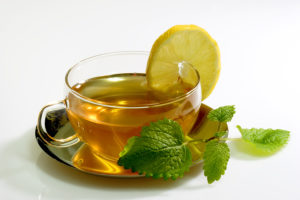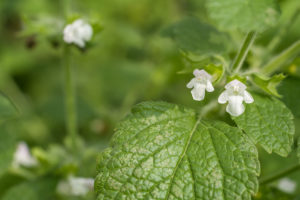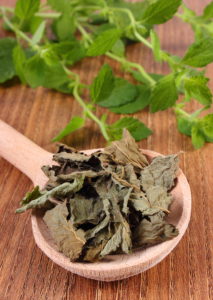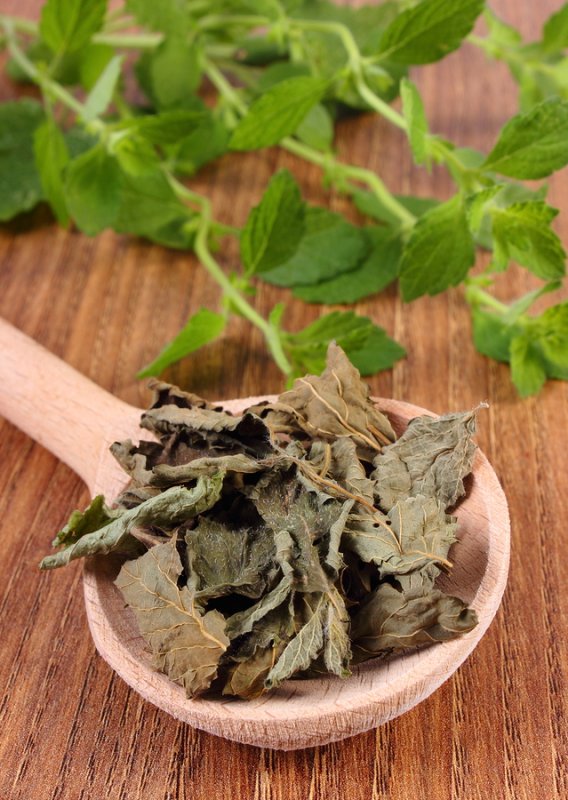Table of Contents
Lemon Balm (Melissa officinalis) is native to the Mediterranean region. And has been cultivated for well over 2,000 years. Melissa officinalis (Melissa is derived from the Greek for ‘honey bee’) was observed by Pliny the Elder as great for attracting bees.
Lemon balm’s appeal continued to grow. It was used as a tea to combat mental confusion, and as an elixir to extend lifespan. In the 17th century, French Carmelite nuns dispensed Carmelite Water. This lemon-balm infused ‘miracle water’ was said to improve memory, vision, and reduce fever, melancholy and congestion.
Melissa tea is used in France today to treat fatigue and headaches. Naturopaths recommend lemon balm to treat cold and flu, lower blood pressure, for insomnia and indigestion.

As a nootropic, lemon balm is used primarily to lower anxiety and boost memory.
Lemon Balm helps:
- Neurotransmitters. Lemon Balm affects brain levels of acetylcholine (ACh). It plays an inhibitory effect on acetylcholinesterase (AChE). AChE is an enzyme that breaks down ACh. Improving memory and cognition.
- Neuroprotectant. Lemon Balm is a potent antioxidant that protects your brain cells from free radical damage.
- Anxiety and stress. Lemon Balm has a significant anxiolytic (anti-anxiety) effect. It raises brain levels of the neurotransmitter GABA by inhibiting the enzyme GABA transaminase. This has an effect on mood regulation.
Overview
Lemon Balm (Melissa officinalis) is an herb that’s native to the Mediterranean region. And now found in gardens throughout Europe and North America.

Lemon balm has a long history as a treatment for stress, anxiety, thyroid issues, indigestion, infections, viruses and inflammation.
Related to the mint family of herbs, lemon balm has a subtle lemon scent. And its small white flowers attract bees. Hence the botanical name ‘Melissa’, which is Greek for honey bee.
The first recorded medical use of lemon balm dates back to Dioscorides, the ancient Greek physician, who used the herb for its anti-bacterial and soothing properties. The famous Swiss Renaissance physician, Paracelsus, called it the “elixir of life”.
In the 16th century, English botanist John Gerard, gave it to his students to “quicken the senses”. This appears to be the first recorded use of the herb for brain and cognitive health.
The most recent research shows lemon balm has remarkable healing and regenerative effects on your brain. It stimulates memory, and supports the health of your brain’s white matter.
Lemon balm’s two primary compounds that affect brain health are eugenol and rosmarinic acid.[i]
Eugenol is an antioxidant 5-times more potent than alpha-tocopherol found in Vitamin E. So lemon balm acts to boost your body’s natural healing processes by eliminating free radicals that damage brain cells.
And lemon balm helps increase levels of your body’s most powerful built-in antioxidants, dismutase and glutathione peroxidase.[ii]
Rosmarinic acid promotes an anti-depressant effect in your brain by downregulating mitogen-activated protein kinase phosphatase-1 (Mkp-1). And it upregulates brain-derived neurotrophic factor (BDNF), along with boosting dopamine synthesis.[iii]
How does Lemon Balm work in the Brain?
Lemon Balm boosts brain health and function in several ways. But two in particular stand out.
- Lemon Balm boosts memory. Lemon balm increases the activity of the neurotransmitter acetylcholine (ACh) in your brain. When your brain sends signals, it uses acetylcholine to keep the signals moving. But once used, your brain removes acetylcholine with an enzyme called acetylcholinesterase (AChE).[iv]
But if you have too much AChE, as is the case with Alzheimer’s patients, it restricts brain signaling. One way to prevent this signal failure is to prevent the breakdown of acetylcholine.
The compound rosmarinic acid in lemon balm encourages blood flow, which helps to keep brain cells from dying.[v] And it inhibits the formation of AChE.
The result is that your brain is stimulated, memories continue to form, and brain fog is eliminated.
- Lemon Balm reduces stress. One-way lemon balm does this is to promote GABA, a glutamate inhibitor in your brain. Glutamate excites brain cells to act. While this excitation is necessary, too much glutamate results in cell death.
Lemon balm promotes a better balance in glutamate levels, and helps new cell growth.[vi] The result is a boost in memory and reduction in stress. Largely due to eugenol, one of the components of lemon balm.
How things go bad
Chronic stress, anxiety, poor blood flow and free radicals (oxidation) can damage your brain. And one of the ways this manifests is memory loss.
It comes as no surprise that people with memory loss experience higher rates of anxiety and depression. As verified in one Australian research study.[vii]
↓ Chronic stress reduces memory capacity
↓ Toxins kill brain cells from the inside
↓ Free radicals destroy neurons and synapses
↓ Acetylcholine (ACh) levels decline
↓ Brain-derived neurotrophic factor (BDNF) declines
Under conditions of chronic stress your brain loses the capacity to transmit signals between neurons efficiently. Memory, cognition, and decision-making all suffer as a result.
Lemon Balm benefits
Lemon Balm undoes damage to the brain caused by chronic stress and oxidative damage. It boosts GABA levels and keeps toxic glutamate overload in check.
Lemon balm inhibits the enzyme AChE that breaks down acetylcholine (ACh) levels in your brain. Boosting ACh improves memory, recall and cognition.
Rosmarinic acid in lemon balm works as an antidepressant. And boosts brain-derived neurotrophic factor (BDNF) which promotes the growth, maturation and maintenance of brain cells.
And the eugenol in lemon balm is a very powerful antioxidant. Eliminating oxidative damage in brain cells by neutralizing free radicals. And boosting your brain’s own antioxidants to provide even more protection.
How does Lemon Balm feel?
The effects of supplementing with Lemon Balm (Melissa officinalis) can provide an anti-anxiety effect within minutes of taking it. Some users say it works as well as popping a Xanax®.
You should experience an increase in focus along with a sense of calm. And even though lemon balm works well as a sleep aid, taking it during the day shouldn’t make you drowsy.
Users report lemon balm effective in taming racing thoughts that come with Obsessive Compulsive Disorder (OCD). Some even use lemon balm as an effective way to control irritable bowel syndrome (IBS).
Lemon Balm Clinical Research
Research continues in medicinal plants and herbs that have been used for millennia to treat cognition and memory problems. One study conducted at the University of Newcastle upon Tyne in the UK, found Melissa officinalis to be one of the strongest in effects on acetylcholine receptors. And being an effective aid for memory.[viii]
Lemon Balm as a Nootropic
Lemon Balm has been shown to improve problem-solving and memory in both human and animal models. And age seems to make no difference. All groups using lemon balm showed boosts in recall and problem-solving.
Some recent studies with Alzheimer’s patients have shown improvement when using lemon balm. In one study done in China, researchers gave Sprague Dawley rats eugenol.
One of the active compounds found in lemon balm, eugenol is a potent antioxidant. In this case it helped test subjects get their memory back.[ix]
Another study noted that lemon balm inhibits acetylcholinesterase (AChE). This enzyme breaks down the critical neurotransmitter acetylcholine (ACh). ACh is crucial to creating memories and cognition. Lemon balm was shown to boost and support mood and memory.[x]
Lemon Balm for Stress Reduction
A double-blind, placebo-controlled experiment was conducted in the UK with 18 healthy volunteers. The subjects received two separate single doses of standardized lemon balm extract (300 mg and 600 mg), or a placebo, on separate days. Followed by a 7-day washout period.
Mood was assessed before dosing, and 1-hour after dosing with lemon balm extract. The study subjects did a 20-minute version of the Defined Intensity Stressor Simulation (DISS) battery of tests.
The results showed that a 600 mg dose of lemon balm eliminated the negative mood effects of doing the DISS tests. They reported an increase in calmness and they were more alert.
The researchers also reported a significant increase in mathematical processing, with no reduction in accuracy. This was after taking the lower 300 mg dose.
The nootropic benefits of lemon balm, according to this test, was a boost in cognition, and had a calming effect.[xi]
Lemon Balm Recommended Dosage
Lemon balm has a long history of use in treating a host of ailments. Including memory and cognition, gas, bloating, earache, vomiting, headache, toothache and insomnia.
 For nootropic use, Melissa officinalis (lemon balm) comes in tea and capsule form. For the most potent dosage find lemon balm extract capsules.
For nootropic use, Melissa officinalis (lemon balm) comes in tea and capsule form. For the most potent dosage find lemon balm extract capsules.
The suggested dose by most naturopaths and alternative health doctors is 300 mg of lemon balm extract 2-3 times per day.
Dosage of lemon balm leaf as a tea is 1 – 2 grams per cup of tea.
You can use lemon balm in the morning to address daytime anxiety. And towards evening to support relaxation and sleep.
Lemon Balm Side Effects
Lemon balm is considered non-toxic and very safe for most users. Most neurohackers won’t experience any side effects.
Note: Lemon balm may have an “antithyrotropic effect“. So if you’re hypothyroid, and on thyroid medication, you may want to avoid using lemon balm.
And use caution when combining lemon balm with; anti-anxiety meds, anti-histamines, muscle relaxers, anti-seizure drugs or tranquilizers.
Type of Lemon Balm to buy
For nootropic use, lemon balm supplements are available as loose-leaf tea, tinctures, and capsules. Most neurohackers use lemon balm capsules which come as ground leaves, or an extract.
The lowest active dose is 300 mg of standard lemon balm. Supplementing above this dose seems to offer dose-dependent benefits. In other words, you’ll get more benefit by taking higher doses. (i.e. 300 mg lemon balm 2-times per day).
Nootropics Expert Recommendation
Lemon Balm extract 300 – 600 mg per day
 I recommend using Lemon Balm as a nootropic supplement.
I recommend using Lemon Balm as a nootropic supplement.
Your body does not make Lemon Balm on its own. So you must take it as a supplement.
Lemon Balm is especially helpful for those suffering from anxiety and stress. Studies show it helps stop and reverse the devastating effects of anxiety and stress on your brain, and body. This nootropic helps repair damage to brain cells caused by chronic stress and anxiety.
Lemon balm is reported to work well for those dealing with Obsessive Compulsive Disorder (OCD). Taming racing thoughts, and helpful in dealing with stressful situations.
Lemon balm is also helpful for those suffering from Alzheimer’s. It has been shown to help reduce agitation and improve symptoms of mild to moderate Alzheimer’s disease. It may also be of benefit in relieving some symptoms of ADHD.
You can safely take up to 900 mg of Lemon Balm (Melissa officinalis) extract daily if needed. One dose first thing in the morning. One dose early afternoon. And the last dose in the evening.
And for memory, lemon balm is great to stack with CDP Choline and Acetyl L-Carnitine.









Join The Discussion - 187 comments
bob
December 2, 2021
Im seeing an integrated dr for certain issues, meanwhile i experiment with different supplements. Had a holy basil tea and lemon balm tea mixed and drank before bed. I know I dont get enough sleep but after an hour of grogginess. I felt great, wish I was like this normally, have no clue what is consistently a good stack. Which leads me to questioning your profile. You were obviously intelligent and successful business wise before diving into nootropics. I just can’t believe your life was ruined or that screwed up until the right nootropic stack came along. Not really knocking you but it doesnt really add up, except to make money off this nootropics youtube channel et al. Its still beneficial for people, I guess for me its highly frustrating some days I feel somewhat normal, which tells me something is off, and I don’t know how to stay consistently normal.
David Tomen
December 4, 2021
Bob, 8 years ago my business was failing as was my marriage and were were broke. I was so sick I felt like I wanted to die. I was diagnosed hypothyroid and had nearly every symptom in the book for this disease. Including losing my memory.
Two different neurologists tested me for Alzheimer’s. My medical records are proof of this. Both said they did not see anything wrong and could not help me. I was on my own. There were no books or websites to help me. I had to read hundreds of clinical studies on PubMed on how memory worked. And was able to figure out which supplements would help me.
It took me 2 1/2 years to get my health and memory back again. So believe what you want. I know that I have helped tens of thousands around the world with what I have learned.
If you want some help I am here for you if you are willing. But if you took the time to read you could help yourself because it is all contained here in hundreds of pages of information available for free.
Fred
July 5, 2022
God bless
Marcus
September 24, 2021
Hi David I am ashamed to ask for your help with something that I suffer regularly in my work, I would like your help please to know which Nootropics can be used to avoid feeling envious of someone else? (Lithium Orate has not helped me)
also if it is not too much trouble, What kind of negative effect does soy have compared to supplement made from sunflower lecithin in the consumption of Phosphatidyl serine? (in a person not allergic to soy)
David Tomen
September 24, 2021
Marcus, Soy isoflavones can mimic estrogen, has a cancer risk, may affect thyroid function, and contains lectins, phytic acid, and oxalates which block the absorption of other nutrients.
But there is no nootropic that has been shown to help with jealousy. That is more of a psychiatric problem and I think you’d have more success with therapy.
Timothy
March 27, 2022
Not sure if this will be relevant, but rather than envy I had many issues with rumination and frustration toward others.
Getting dopamine and serotonin replenished helped a lot. (Tryptophan and 5HTP for serotonin, tyrosine and mucuna for dopamine. My serotonin pathway is a mess genetically, and I’m still determine why my dopamine isn’t performing. Maybe BH4 deficiency via CBS gene issues.)
Then this morning I woke up great from testing lemon balm (with theanine which I saw recommended, along with mucuna, 5HTP, and huperzine that I’ve used for a while before) and I feel much more capable of handling my challenging perspectives. It’s not that they’re magically gone, but rather that my neurochemistry is calm and balanced, so I can better process what’s in me.
So the envy may not be the problem (unless you’re really judging it as “bad” and stagnating it, like I did with anger), but rather there could be an inability to regulate the nervous system and process things normally.
Lithium has helped soothe me a little bit, sometimes enabling sleepiness or naps, and made my high doses of B12 and folate more effective. It helped my mood only slightly, and in tandem with 5HTP.
Paolo
September 12, 2021
What should be the amount of rosmarinic acid for 300-600mg lemon balm ?
Because my supplier claim to have 12% rosmarinic acid while i have seen in america supplements with the highest amounts contain 4% rosmarinic acid.
So would for my supplement be the recommended dose about 100-300 mg ?
But my supplier advice to use 2-4 tablets of 200mg 12% daylie.
David Tomen
September 13, 2021
Paolo, there isn’t a recommended amount of rosmarinic acid content for Lemon Balm and it’s why my recommended dose is 300 – 600 mg per day. Because it depends on the strength of the extract. I suggest relying on the manufacturer’s recommendation in this case because they know their product better than anyone else.
Ralf
June 28, 2021
Hello David, is it safe to take Lemon Balm or for example Passionflower with irreversible MAOI? (parnate)
Because I read that they are weak MAOI‘s so I hope you could tell me if I will be fine combining they with my medication? I think either one would help me with agitation anxiety and insomnia. Thanks
David Tomen
June 29, 2021
Ralf, Lemon Balm should be OK because it affects GABA and MAOIs affect dopamine, norepinephrine, and serotonin.
As for Passionflower I do not know because I have not done the research yet. You can do a search for “How does Passionflower work in the brain” and find out for yourself if it affects dopamine, norepinephrine, or serotonin. If it does then you should avoid it.
Carlos
May 31, 2021
Hi David, in my country I can’t get Mind Lab Pro, do you recommend me that I consume all the Mind Lab Pro ingredients individually or just with “Lions Mane”, “Rhodiola Rosea” and “PS Phosphatidylserine” is it enough? (I already consume Tyrosine, Theanine and a good Multivitamin individually)
– I would also like to know please if this product would be a good alternative to consuming the Mind Lab Pro ingredients individually? Lion’s Mane Mind Formula by DailyNutra
David Tomen
June 1, 2021
Carlos, I already responded to your question about comparing Mind Lab Pro to this supplement by DailyNutra in another thread. There is no comparison. And would not recommend using it simply because it contains Huperzine-A. Which means you can only safely use their nootropic stack every 2nd or 3rd day.
The only “alternative” to Mind Lab Pro is using each of the ingredients in Mind Lab Pro as individual supplements. As you mentioned in your first paragraph. But you are missing two critical components for this stack and that’s Citicoline and Pine Bark Extract.
Cristina
May 17, 2021
Hi David, I like to know please if the amount of Milk Thistle extract in this supplement in enough to counteract the negative effects of Berberine: Berberine HCL + Silymarin
— and finally if this turmeric supplement is good enough or the 500 Mg version is better compared to the same brand: Doctor’s Best Curcumin (C3 Complex) & BioPerine
David Tomen
May 18, 2021
Cristina, the Nootropics Depot Berberine with Silymarin should be fine.
And the Doctor’s best Curcumin checks all the boxes with 95% curcuminoids & BioPerine and would be a good supplement if they didn’t include magnesium stearate and silicon dioxide with it.
Cristina
May 18, 2021
Hello David, I expressed badly before and my question was not understood, I actually wanted to know if Curcumin is better to consume it at 500 mg or is better to consume it at 1000 mg at a time?, since I cannot find 750 mg doses in my country.
— Also I would like to know if it is normal for Curcumin to make me sleepy or does it mean it’s not for me?
— Finally, I would like to know, since you have hypothyroidism and you take Lemon Balm, can a person who takes T4 for suffering from hypothyroidism take lemon balm also? (due to its antithyrotropic effect)
Thank you for answering David, God bless you for your goodness
David Tomen
May 19, 2021
Cristina, curcumin should not make you tired and if it does either you are using too much or it is simply the wrong supplement for you. 500 mg Turmeric (95% Curcuminoids) is effective if used with Piperine or BioPerine. But 500 mg plain Turmeric powder is not very effective.
Great question about Lemon Balm and the answer is it depends on how your system reacts to using it as a supplement. I can use Lemon Balm with no problem but I cannot use Ashwagandha. So my answer is “it depends…”.
Matt
April 30, 2021
Hi Dave,
What is the caution with using Lemon Balm with anti-histamines? I take 1 Zyrtec a day (10mg). Would that be a problem?
Thanks
David Tomen
April 30, 2021
Matt, Lemon Balm acts as an acetylcholinesterase (AChE) inhibitor. And histamine causes the release of acetylcholine. Too much acetylcholine can be bad news. And why caution if combining the two is advised.
Matt
April 30, 2021
Great, that explains it. Thank you David
Brandon
April 13, 2021
There is a report of someone taking 1500mg, and feeling “amazing”.
https://erowid.org/experiences/exp.php?ID=108244
David Tomen
April 15, 2021
Brandon, Lemon Balm is a pretty amazing supplement. So it is no surprise. But dosages of 1500 mg daily long-term is a complete unknown and likely not a good idea.